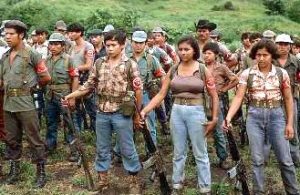Former Guerrilla Fighters Tell How They Organized Security
This report is a small excerpt from discussions with former guerrilla fighters about how they organized security in areas they liberated during the civil war (1979-1992). Masses of rural and city workers fought the murderous US-backed fascist government’s army and death squads. Their experiences help to show how communist society will deal with security, without police, when the communist-led masses lead all aspects of life.

Red Flag interviewed two ex-members of the FMLN. One of them is now a Red Flag reader and the other is a member of the International Communist Workers’ Party. They, and other comrades, have some knowledge about how to combat bad attitudes within a revolutionary process.
We asked: “How were security and discipline maintained at the fronts during the armed conflict here? How were problems solved in cases of misconduct, theft, or betrayal?”
“Criticism and self-criticism, democratic centralism, as we called it at that time, helped us overcome some problems of indiscipline that occurred in the liberated areas,” replied a former FMLN fighter. His whole family was organized at the beginning of the 1970s in a battalion in the northern part of Morazán.
His story continued: “We had some problems with some comrades who, when we were walking near the highway, stopped cars and asked them for money, without authorization from the leadership. We discovered this quickly, because we didn’t have any money. So if someone started buying things somewhere that we were passing by, we stopped it quickly.
“There was one person who had done this several times already. He wasn’t being conscious of the revolutionary role that we were trying to learn and teach. As punishment, the political leadership confiscated his rifle, reduced his food ration and he walked with us, but he was more exposed because of going without a weapon.
“We didn’t have anything like the military police. It was more that the leadership carried out the political and ideological struggle with us. When we got organized, they gave us a book called ‘The 15 Principles of the Guerrilla,’ which explained how the new person in society should be.”
Struggling to Develop Comrades
Another ex-member of the FMLN said, “I was in a trial involving two comrades who were captured in combat and then joined us in the guerrilla. They were accused of bringing with them behaviors of using drugs that they had been taught in the barracks. There were seven comrades who were like the jury. We deliberated for a long time. We were five against two. They wanted to execute them for this alleged offense.
“We had made many mistakes and I did not want to make one more. I said that I had been in battle together with these two defendants, and that at no time had I seen any bad attitudes. That, on the contrary, in an action we carried out, one of our comrades was hurt. These ex-soldiers, instead of running away or deserting, took him out of the area to the civilian population so that they could treat him. And he recovered.
“I told the other comrades of the jury that I never saw them wanting to return to the soldiers. After the battle, they presented themselves to the guerrilla leader and handed him the rifle recovered from the wounded comrade. By the end of the war, they were military commanders. What if we had executed them? I always thought that we had to study the cases well and not act like we were police.”
These and many other experiences show that the communist masses can and will run society collectively without any bosses or police. We will encourage and nurture everyone’s participation in a way that strengthens the collective.


